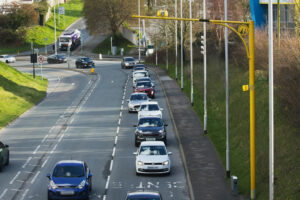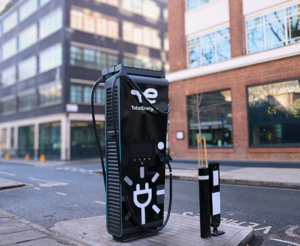The Department for Transport (DfT) has outline a new vision to significantly increase the number of electric car chargepoints across England’s strategic network over the next decade.
According to the DfT, England’s motorways and major A roads, drivers are currently never more than 25 miles away from a rapid chargepoint. Now, government aims to ensure every motorway service area will have a minimum of six ultra-rapid chargepoints, with some larger sites having as many as 10-12, by 2023. This means that many drivers will be able to charge their cars in around 15 minutes, three times faster than they can currently.
The new vision forms part of the UK’s commitment to supporting growth of green, zero emission technologies. As a result, the DfT is currently consulting on the best way to bring forward the end of the sale of new petrol and diesel cars and vans to 2035 or possibly earlier ‘if a faster transition is feasible.’ Extensive public charging infrastructure across the UK’s motorways and major A roads is a key part of this transition, it said.
Government has undertaken a detailed analysis to assess the number of chargepoints required to meet future en route charging needs along motorways and major A roads.
As of January 1st 2020, there was a total of 809 open-access rapid chargepoints. This includes an average of two rapid chargepoints at motorway service areas with more being rolled out over the next year.
In the March 2020 Budget, the Rapid Charging Fund was announced as part of a £500 million commitment for EV charging infrastructure. The purpose of this programme will be to ensure that there is a rapid-charging network ready to meet the long-term consumer demand for electric vehicle chargepoints ahead of need.
It will be available to fund a portion of costs at strategic sites across the strategic road network where upgrading connections to meet future demand for high powered chargepoints is prohibitively expensive and uncommercial. Timing and process for delivery of this funding will be confirmed in due course.
The following ambitions will be supported by the Rapid Charging Fund to assist where the electrical connection costs of upgrading sites to meet future charging demand is not commercially viable.
- By 2023, the DfT aims to have at least 6 high powered, open access-chargepoints (150 – 350 kilowatt capable) at motorway service areas in England, with some larger sites having as many as 10-12. DfT says it is confident this will be more than enough to meet demand from electric vehicles by this date. These high powered chargepoints are able to charge up to three times faster than most of the chargepoints currently in place, and can deliver around 120-145 miles of range in just 15 minutes for a typical electric vehicle.
- By 2030, DfT expects the network to be extensive and ready for more people to benefit from the switch to electric cars. DfT is planning for there to be around 2,500 high powered chargepoints across England’s motorways and major A roads.
- By 2035 DfT expects around 6,000 high powered chargepoints across England’s motorways and major A roads.
Government will be working with the operators of major service areas to ensure that this charging provision is in place ahead of customer demand. The aim is to help support early adoption of electric vehicles and remove range anxiety concerns for drivers on long journeys, says the DfT.
The aim for use of the chargepoints will be:
- drivers can pay for the cost of charging their vehicle using debit or credit card payment
- information about the chargepoints on motorways will be openly available, helping drivers choose when, where and how they charge
- chargepoints will be available 99% of the time
- drivers will be supported by 24/7 customer care to handle any technical issues
- sites will have chargepoints that support all types of electric vehicles
- there will be a clear¯pricing information available in pence per kilowatt hour
Working with industry, the government will continue to monitor the number of chargepoints being installed across our motorways and the associated customer experience. The DfT does also have powers under the Automated and Electric Vehicles Act to bring in regulations if necessary, to improve the consumer experience of using electric vehicle charging infrastructure and to ensure levels of chargepoint provision at key sites such as motorway service areas.
























